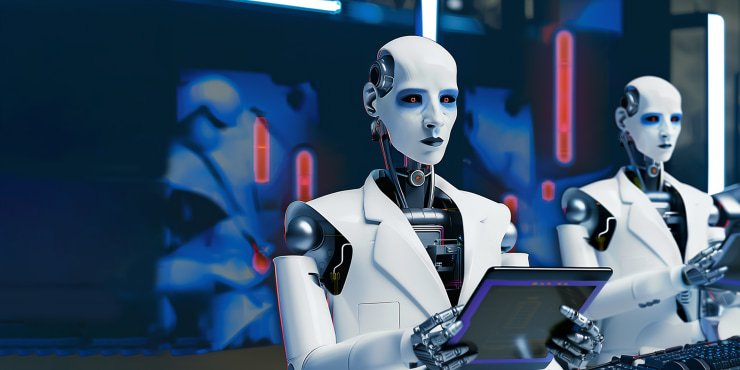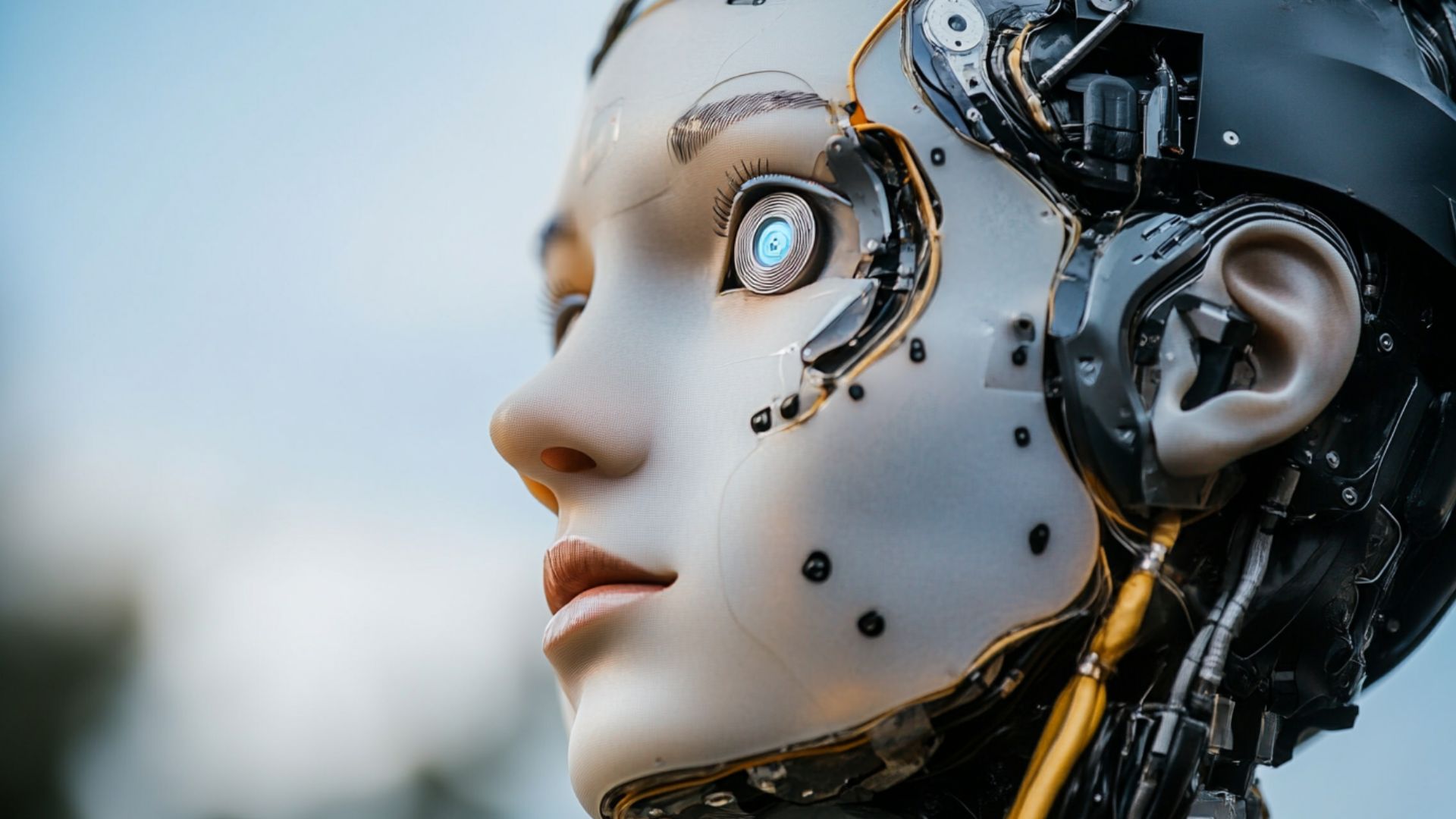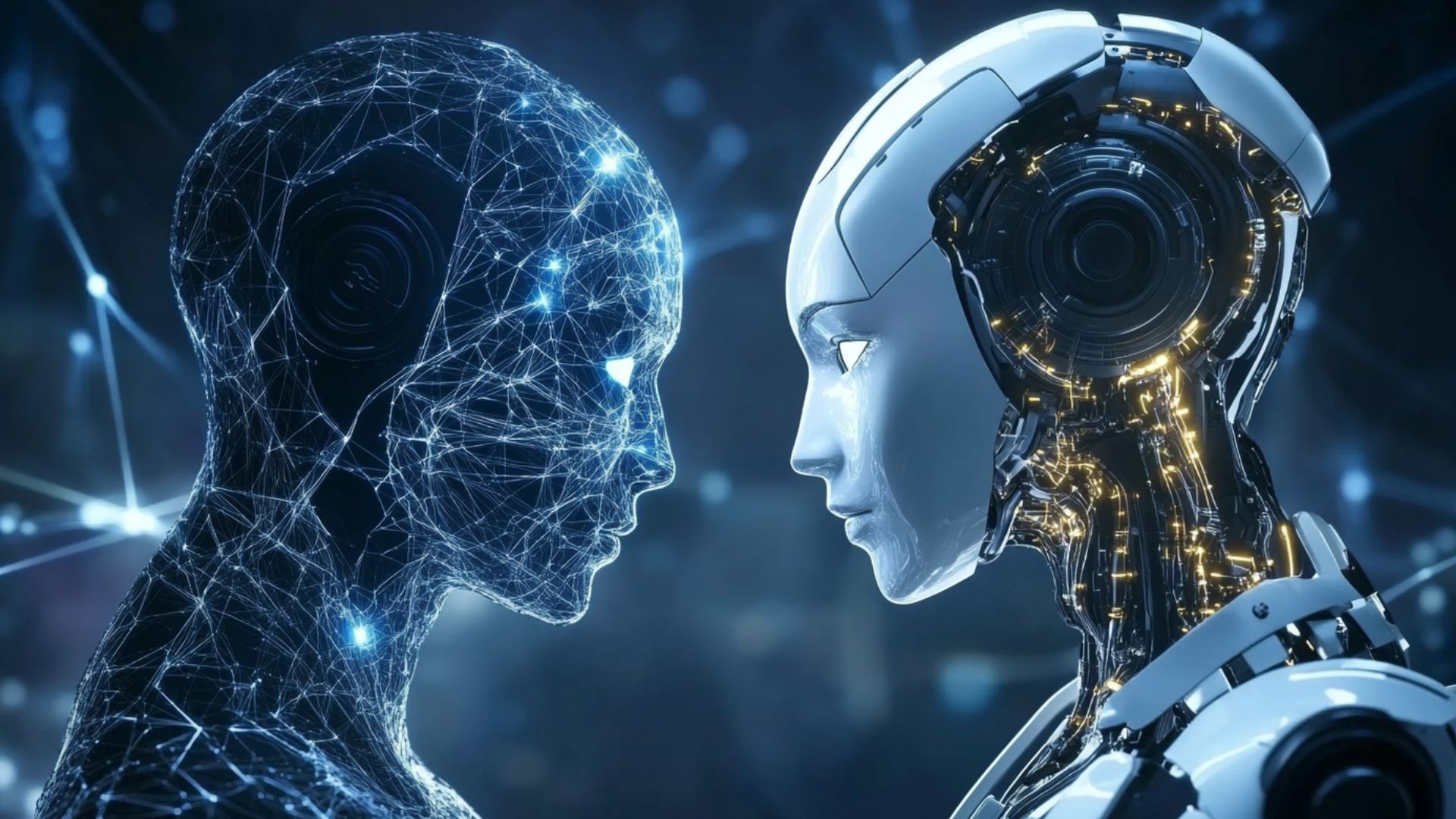Reimagining Healthcare with AI and Automation

The healthcare industry, long accustomed to gradual evolution, is on the precipice of an exponential leap. AI and robotization technologies are no longer speculative concepts. They are powerful tools ready to reshape how we deliver care and engage with patients.
This wave can potentially address some of the industry's most entrenched challenges. Healthcare costs and limited access to specialists can be tackled with AI-driven diagnostics. It frees up valuable time for human interaction. Imagine a future where AI algorithms assist doctors in pinpointing diseases with accuracy. It allows for earlier intervention and personalized treatment plans. Beyond benefits, AI holds the promise of accelerating medical research and drug discovery. It will pave the way for groundbreaking advancements.
We integrate AI and automation in the healthcare sector ecosystem. So, we can move towards a future. There, patients have greater control over their health, and providers have the tools to deliver the highest standard of care.
The Role of Automation in Healthcare Innovation
The healthcare industry is undergoing a radical shift driven by robotization. This wave of innovation is streamlining everything from scheduling to complex diagnoses. Robotization tackles repetitive tasks with pinpoint accuracy. It frees up medical professionals for crucial patient interactions.
It not only optimizes operations. It also empowers healthcare providers to deliver superior care. From the moment a patient enters the system to the implementation of advanced treatment plans, robotization is revolutionizing how we experience healthcare.
Streamlining Administrative Processes
Traditionally, administrative tasks in healthcare have been time-consuming and prone to human error. However, automation is changing the healthcare game. Here's how:
- Appointment Scheduling and Reminders. Robotized appointment scheduling systems allow patients to book appointments online 24/7. It reduces phone wait times and frustration. Also, robotized reminders ensure fewer missed appointments, optimizing clinic schedules.
- Patient Records Management. Electronic Health Records (EHRs) with robotization features can streamline data entry. It improves record-keeping accuracy and facilitates faster information retrieval for healthcare providers. It translates to quicker diagnoses and better-informed treatment decisions.
- Billing and Claims Processing. Automation of healthcare billing and insurance claims processes reduces errors. It expedites payments and frees up staff time that can be dedicated to patient care. Also, robotization can identify potential insurance coverage issues more efficiently. It minimizes billing delays and frustrations for patients.
Robotization in healthcare is a game-changer. Streamlined appointment scheduling through online tools or robotized reminders cuts down wait times. It frees up staff and patients' time. Also, robotized data entry in electronic health records minimizes errors. It ensures vital patient information is accurate and readily available. This translates to a more efficient healthcare system. There is improved patient satisfaction and a smoother overall experience for everyone involved.
Advancing Diagnostic and Treatment Capabilities
Beyond streamlining administrative tasks, automation in healthcare is making significant strides in:
- Diagnostics.
- Treatment.
Here's where it shines:
- AI-driven Imaging Analysis. AI is revolutionizing medical imaging. AI algorithms can precisely analyze X-rays, MRIs, and CT scans. It aids in earlier and more accurate diagnosis of diseases like cancer. It allows for quicker intervention and potentially improves treatment outcomes.
- Robotic-assisted Surgery. Robotic surgery allows surgeons to perform minimally invasive procedures with unparalleled precision. This translates to smaller incisions, quicker recovery times, and reduced postoperative pain. Robotic systems also offer enhanced dexterity and visualization for surgeons. It leads to potentially better surgical outcomes.
A study published in a leading medical journal showcased the power of healthcare AI automation in cancer detection. Researchers trained an AI algorithm to analyze mammograms. The study demonstrated that the AI system could identify breast cancer with higher accuracy than human radiologists alone. It has the potential to save countless lives through earlier detection and intervention.
Minimally invasive robotic surgery for prostate cancer removal is a prime example of robotization. Studies have shown that robotic procedures offer faster recovery times. It reduces blood loss and minimizes scarring. It translates to a quicker return to normal life for patients.
Robotization is playing a pivotal role in healthcare innovation. It streamlines administrative processes, enhances diagnostic precision, and optimizes treatment protocols. It's paving the way for a more efficient, accurate, patient-centered system.
AI's Transformative Impact on Patient Care

AI is rapidly transforming the landscape of healthcare. AI automation healthcare ushers in a new personalized and proactive patient care era. From analyzing vast medical data to providing real-time support, it holds immense potential. It's to elevate the quality of care for patients. This list explores three key areas where AI is making a significant impact. They are predictive analytics, personalized medicine, and virtual health assistants.
Personalizing Medicine with AI
One of the most exciting applications of AI in healthcare is its ability to personalize medicine. This approach moves beyond a one-size-fits-all treatment model. It tailors interventions to an individual's unique genetic makeup, medical history, and lifestyle. Here's how AI is making personalized medicine a reality:
- Genetic Profiling. AI automation algorithms in healthcare can analyze a patient's genetic data. It's to identify potential disease risks and predict personalized treatment responses. It allows doctors to address potential health concerns and tailor medications to genetics. It potentially minimizes side effects and improves treatment effectiveness.
- Tailored Treatment Regimens. AI can analyze vast datasets of medical research. It's to identify optimal treatment regimens for specific patient profiles. This takes into account some factors. They're a patient's age, medical history, and response to previous treatments. With AI, doctors can make more informed decisions about treatment plans. It potentially leads to better clinical outcomes for patients.
Personalized care with automation in the healthcare sector can revolutionize healthcare by:
- Improving Treatment Effectiveness. Tailoring treatments based on individual needs can lead to more effective interventions. This can result in faster recovery times, reduced hospital readmission rates, and improved survival rates.
- Reducing Side Effects. AI-powered treatment plans can minimize adverse reactions, improving patient comfort and overall well-being.
The ability to personalize medicine using AI offers a paradigm shift in healthcare. It empowers doctors to deliver more targeted and effective care for each patient.
AI-Powered Virtual Health Assistants
The emergence of AI-powered virtual health assistants (VHAs) marks another transformative innovation. These intelligent chatbots utilize AI algorithms to interact with patients. They offer crucial support and guidance in managing their health:
- Enhancing Patient Engagement. Healthcare automation bots can provide patients with 24/7 access to info. This can answer basic health questions, schedule, and connect patients to healthcare resources. It promotes greater engagement and empowers patients to take a proactive role in their health.
- Medication Reminders and Monitoring. VHAs can send personalized medication reminders, ensuring patients adhere to their treatment plans. Also, they track health vitals through wearable devices. And they alert patients or healthcare providers of any concerning trends. This proactive approach can help prevent complications and promote timely intervention when needed.
Virtual health assistants offer a range of benefits for patients, including:
- Improved Self-Management. With access to timely information and reminders, patients can better manage chronic conditions. This helps them better maintain their health.
- Increased Accessibility. VHAs offer a convenient and accessible way for patients to receive guidance and support. It's particularly in geographically remote areas or for those with mobility challenges.
- Reduced Healthcare Costs. By promoting self-management and preventing complications, automation of healthcare can contribute to cost savings.
The potential for AI-powered VHAs to empower patients and improve self-management is significant. This technology is transforming the way patients interact with the healthcare system. It fosters a more proactive and collaborative approach to health management.
Overcoming Challenges in AI and Automation Adoption

AI and automation in healthcare hold immense promise. However, their adoption faces significant hurdles. Here, we explore key challenges and potential solutions for navigating them:
- Ethical Concerns. AI algorithms are only as good as the data they are trained on. Bias in training data can lead to discriminatory outcomes in patient care. The healthcare industry needs to ensure transparency and fairness in AI development. This includes involving teams in developing tools and establishing ethical guidelines.
- Data Privacy and Security. AI relies heavily on patient data. Strict regulations like HIPAA govern data privacy in healthcare. Striking a balance between leveraging data for AI development and ensuring patient privacy is crucial. Robust data security measures must be in place to protect sensitive patient information.
- Interoperability Issues. Healthcare data often resides in siloed systems across different hospitals and clinics. This fragmented landscape makes it difficult to share data effectively. And it hinders AI development. Implementing standardized data formats and promoting interoperability between healthcare systems is essential. It's for unlocking the full potential of AI automation in healthcare.
The healthcare industry can overcome these challenges. It's through collaboration and a focus on responsible AI development:
- Industry-wide Collaboration. Collaboration between healthcare providers, technology developers, and policymakers is crucial. It's to address ethical concerns and establish robust data privacy frameworks.
- Focus on Explainable AI. Developing and implementing "explainable AI" systems is key. This allows healthcare professionals to understand how AI algorithms reach their conclusions. It fosters trust and ensures ethical decision-making.
- Investing in Data Infrastructure. Investing in secure and interoperable data infrastructure will facilitate data sharing. It accelerates AI development across the healthcare sector.
Address issues and prioritize responsible AI implementation. Then, your clinic can unlock the transformative potential of AI and robotization. It leads to better patient care, improved health outcomes, and an efficient system.
The Future of Healthcare: AI and Automation Frontiers
The future of healthcare is brimming with possibilities fueled by AI and robotization. Here, we explore some potential groundbreaking innovations and their transformative impact:
- AI-Enhanced Telemedicine. Telemedicine will likely become even more sophisticated with AI integration. Imagine AI consultations that can triage symptoms. Those conduct preliminary diagnoses and even recommend initial treatment plans. This could significantly reduce wait times for specialist appointments. It can improve accessibility to care, particularly in remote areas.
- Precision Medicine 2.0. Personalized medicine will likely evolve to a more advanced stage. It will incorporate real-time data analysis by healthcare AI automation. Wearable devices and continuous health monitoring will feed information into AI algorithms. It will allow for personalized treatment adjustments and preventive interventions.
- Robotic Surgery Advancements. Surgical robots will likely become even more precise and dexterous. It potentially enables minimally invasive procedures for a wider range of surgeries. AI healthcare automation integration in robotic surgery could further enhance decision-making during operations. It leads to improved patient outcomes and faster recovery times.
- Robotized Chronic Disease Management. AI-powered systems can revolutionize chronic disease management. Imagine AI helpers that track patients' health data. It provides medication reminders and even offers personalized coaching. This approach could empower patients to better manage their conditions and prevent complications.
The path forward for healthcare innovation lies in embracing these advancements. However, ensuring ethical implementation is also crucial. Here are some key considerations when using AI automation in healthcare:
- Focus on Human-AI Collaboration. Healthcare professionals will likely play a vital role alongside AI. They will leverage its power to improve decision-making while focusing on the human touch in patient care.
- Prioritizing Patient Education. AI has become more integrated into healthcare. So, educating patients about its role and ensuring transparency are crucial. It's to build trust and confidence in these technologies.
- Addressing Equity and Accessibility. The healthcare industry must work towards ensuring equitable access to AI-powered healthcare solutions. This includes addressing potential financial barriers and promoting digital literacy. It's to bridge the digital divide.
By using these innovations in healthcare, AI and automation hold the potential to transform this sector. It leads to a future of personalized care, better health outcomes, and a more efficient system for all.


